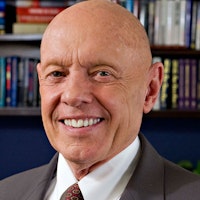Certainly principles have a moral and spiritual foundation, but no religion has a patent on them. They are not unique to any religion. They are universal and timeless.
Certainly principles have a moral and spiritual foundation, but no religion has a patent on them. They are not unique to any religion. They are universal and timeless.
Stephen R. Covey

Universal Principles
Topic: Virtue, Morality, & Ethics
Certainly principles have a moral and spiritual foundation, but no religion has a patent on them. They are not unique to any religion. They are universal and timeless. I have seen in organizations throughout the world that when there is a spirit of openness and synergy, all the values an individual organization works with are essentially identical to those of other organizations. Yes, there are different practices, and the labels—the words used to define and describe the particular values may be different—but what is being said is essentially the same. It all deals with meaning and integrity.
Stephen R. Covey was born in Salt Lake City, Utah, on October 24, 1932, and he passed away on July 16, 2012. He was more than an educator and author; he was also a family man deeply rooted in his faith. Covey was a member of The Church of Jesus Christ of Latter-day Saints. His belief in God and universal principles significantly influenced his teachings and writings. Married to Sandra Merrill Covey for over 50 years, the couple had nine children. Covey's family life and faith were central to his understanding of leadership and personal effectiveness, themes he explored in books like "The 7 Habits of Highly Effective Families."
Covey was a professor at the Jon M. Huntsman School of Business at Utah State University at the time of his death. But he was best known for his book "The 7 Habits of Highly Effective People." This book was part of a broader collection of works that also includes titles like "First Things First," "Principle-Centered Leadership," and "The 8th Habit." These books weren't just about being effective in business; they were about how to live a balanced, meaningful life.
Stephen R. Covey left a lasting impression through his teachings and writings, but perhaps his most enduring legacy is the way he lived his life. He emphasized the importance of character, integrity, and ethical leadership. These were not just principles he talked about; they were principles he lived by. His lessons continue to influence people all over the world, encouraging them to lead lives that are not only effective but also grounded in good values.
Covey, Stephen R. “Interview with Stephen R. Covey.” Globaldharma.org, Spiritual-Based Leadership, p. 7 [The Global Dharma Center (GDC), 27 June 2006, (bit.ly/2Kt9sZv)].

Stephen R. Covey

Stephen R. Covey: Spiritual View of Life
Spiritual Theme
Distinction Between Spirituality and Religion
Practicing Universal Principles
I just finished going through four countries in Africa, three countries in the Middle East, India, and Sri Lanka, with the effort to bring together principles that are universal and timeless. I taught from Hinduism, I taught from Islam, I taught from Christianity. I just did a satellite interview to China explaining what this material can do for a Confucian nation. I teach the exact same principles no matter where I am and show that there is a universal character to these principles. They are metaphysical, they transcend the outside physical world, and they guide all behavior, all thinking, and many of them are built into assumptions that people make about nature and life.
If controversies arise or if people start feeling that I am being too religious, I say, “Let’s just stick with those principles that we all agree on. Let’s see if we can follow the principles of fairness, kindness, respect, the development and use of peoples’ talents, having meaningful work, and living with integrity. Let’s see if we can agree upon these, let’s go to our hearts and our souls and live with integrity.” That’s what I am teaching.
—Stephen R. Covey [“Spiritual-Based Leadership” Interview, The Global Dharma Center (Globaldharma.org)].
To be a spiritual-based leader
Resources
Related Quotes
Copyright © 2017 – 2026 LuminaryQuotes.com About Us